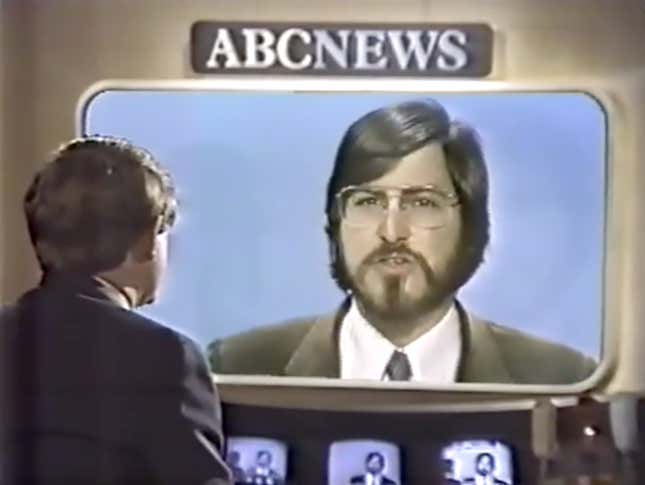
From the perspective of the early 21st century, it’s safe to say that computers have been a privacy nightmare. Our world is so interconnected by machines, that corporations, governments, and almost anyone can find out almost anything they want about an average citizen thanks to our digital footprints. But the late Apple cofounder Steve Jobs gave an interesting ABC News Nightline interview in 1981 where he assured Americans that privacy wouldn’t be a problem if people became computer literate.
The newscast, hosted by Ted Koppel and currently available on YouTube, opens with a fascinating snapshot of the era, and I highly recommend watching the entire 12-minute segment. It opens with a reference to a computer problem at Cape Canaveral and then goes into the many ways that computers were taking over the world in 1981. The segment launches into concerns over privacy, something that comes up again and again in the relatively short video.
But Jobs is there to reassure everyone that computers will actually liberate humanity, making us free to pursue creative endeavors. Jobs refers to computers as the “bicycle of the 21st century” and even uses the term “democratic” twice, a slippery attempt to dispel concerns over government surveillance while pushing the idea that universal adoption of computers will create a healthier society.
“There is a sense, though, that many of us have, who really don’t understand how computers work or what they do for us or to us, that we are getting controlled by the computers. Any danger of that happening?” Koppel asks Jobs.
“Well, as you know, the product we manufacture, many people see it for the first time, and they don’t even think it’s a computer. It’s about 12 pounds, you can throw it out the window if the relationship isn’t going so well,” Jobs said. “And I think if you look at sort of the process of the technological revolution that we’re all in, it’s a process of taking very centralized things and making them very democratic, if you will—very individualized, making them affordable by individuals for a small collection of tasks, if you will, sort of from the passenger train to the Volkswagen.”
Jobs goes on to say that computers will allow us to avoid the drudgery of life and instead work on the “creative level.”
Koppel also had on the program journalist David Burnham who raises the issue of privacy in the near future. Burnham points out that the Census Bureau helped locate Japanese-Americans in 1941 to throw them into internment camps and worries that computerization might open the door to terrifying new possibilities.
“The government has the capacity by using computers to get all kinds of information on us that we’re really not even aware that they have,” Koppel tells Jobs. “Isn’t that dangerous?”
“Well, I think the best protection against something like that is a very literate public, and in this case computer literate,” Jobs responds. “And I think you’re actually seeing that happen right now. In the personal computer area [...] we’ve already reached approximately one in every thousand households in the United States, and I think over the next five or six years, that figure will be one in ten. Ultimately it will be one in one.”
“And I think the feeling of computer literacy among the populous is the thing that, for me at least, gives me the most comfort—that that centralized intelligence will have the least effect on our lives without us knowing it,” Jobs continued.
How do you think Steve did? Was he right? Or does Burnham have a point, knowing what we know today about how the world is plugging along? President Trump is currently suggesting that his political opponents be arrested for treason and has floated the idea of civil war if he’s impeached. Not only is this the guy with the nuclear codes, he has access to troves of data that the federal government has collected on us. It certainly gives the discussion a sense of urgency, if nothing else.